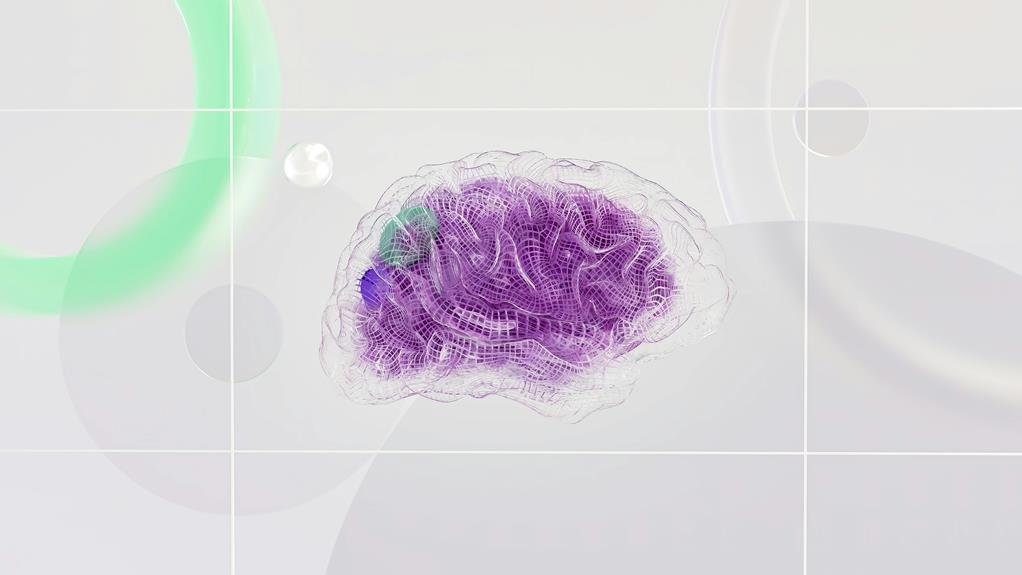Secrets of the Adhd Brain
Like a complex puzzle waiting to be solved, the ADHD brain holds intriguing secrets that can reshape our understanding of neurodiversity. Unraveling the intricacies of this unique nervous system reveals a world of untapped potential and hidden strengths that often go unnoticed.
By peeling back the layers of misconceptions surrounding ADHD, we can discover a treasure trove of insights that promise to revolutionize how we perceive and support individuals with ADHD. Join me as we explore the depths of the ADHD brain and uncover the mysteries that lie within.
Key Takeaways
- ADHD brains excel in creative problem-solving skills.
- Hyperfocus enhances productivity and efficiency in tasks.
- Divergent thinking fosters unique connections and solutions.
- Tailoring tasks to individual interests boosts engagement and motivation.
ADHD Brain Functioning
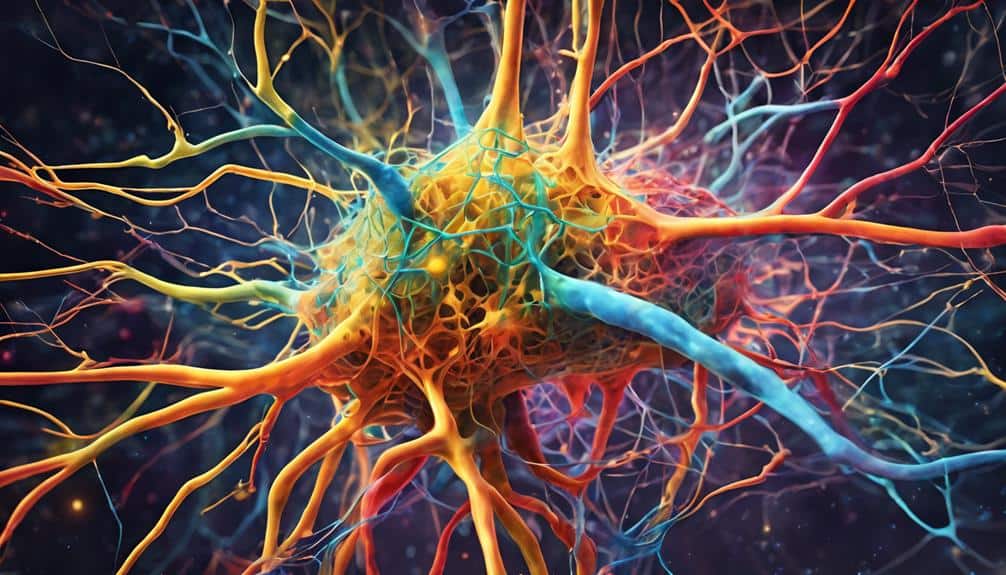
The functioning of the ADHD brain presents distinct cognitive patterns that greatly impact attention regulation and emotional processing. In individuals with ADHD, the brain's ability to regulate attention differs from neurotypical brains, leading to challenges in sustaining focus on tasks. Emotional processing is also affected, as individuals with ADHD may experience rejection sensitive dysphoria, an intense emotional response to perceived rejection or failure. Motivation, a key aspect of task completion, is often a struggle for those with ADHD due to their unique brain functioning. This can manifest as difficulty in determining the importance of tasks or in initiating and maintaining focus on them.
Additionally, ADHD brains exhibit phenomena such as hyperfocus and hyperfixation, where individuals can intensely concentrate on tasks or interests that captivate them. Trying to conform to neurotypical standards may not be the most effective approach for individuals with ADHD, as their brains operate differently. Understanding the mysteries surrounding ADHD motivation and rejection sensitive dysphoria can provide valuable insights into the intricate functioning of the ADHD brain.
Unique Characteristics of ADHD Brain
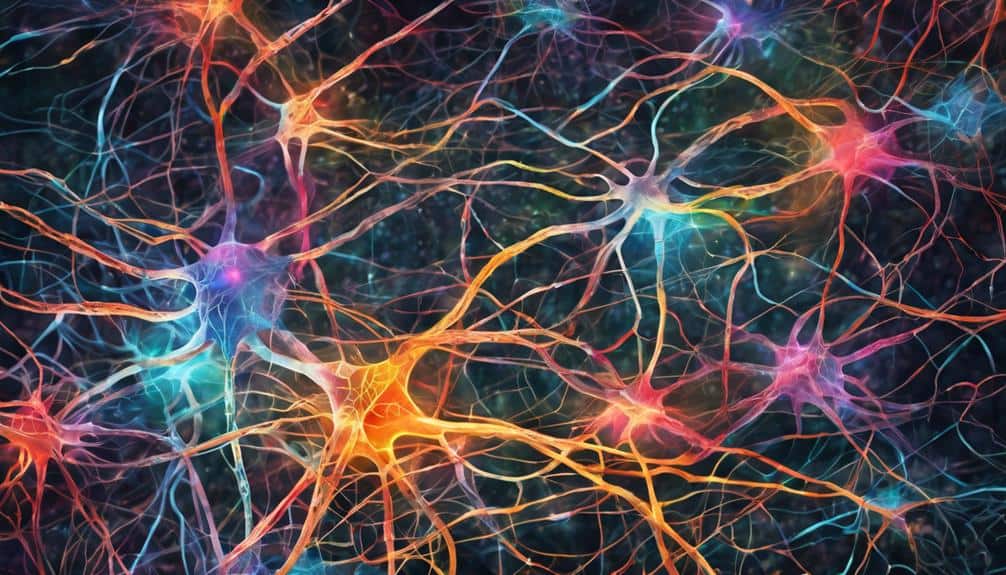
Upon examining the unique characteristics of the ADHD brain, distinct structural and functional variances become apparent when compared to non-ADHD brains. In the ADHD brain, the neurotransmitters dopamine and norepinephrine play critical roles in regulating attention, focus, and impulse control. These neurotransmitters are often dysregulated in individuals with ADHD, contributing to challenges in working memory, organization, and impulse control.
Individuals with ADHD commonly exhibit traits such as hyperactivity, impulsivity, and difficulties in sustaining attention on tasks. Despite these challenges, the ADHD brain also demonstrates remarkable strengths. One notable aspect is the potential for enhanced creative thinking and problem-solving skills. The unique wiring of the ADHD brain can lead to unconventional yet effective approaches to tasks that require 'outside-the-box' thinking.
Understanding the distinct characteristics of the ADHD brain can provide valuable insights into how to support individuals with ADHD in optimizing their strengths while addressing areas of difficulty.
Challenges Faced by ADHD Brain

When faced with the challenges of ADHD brain functioning, individuals often encounter difficulties in maintaining consistent attention levels, impacting their ability to prioritize tasks effectively. The inconsistency in attention can lead to challenges in decision-making and task prioritization, making it harder to stay focused on important activities. In traditional environments such as schools or workplaces, where structured schedules and rigid expectations prevail, individuals with ADHD may find it particularly challenging to thrive due to their unique brain functioning.
Procrastination is a common behavior among those with ADHD, as tasks that don't align with their interests may be put off in favor of more stimulating activities. This can further exacerbate difficulties in meeting deadlines and accomplishing goals. When conventional systems don't accommodate the strengths of the ADHD brain, individuals may struggle unnecessarily, leading to impairments in various aspects of their lives.
Understanding and embracing the differences in ADHD brain functioning is essential for developing effective strategies to manage symptoms and navigate daily challenges successfully. By tailoring environments and approaches to align with the strengths of the ADHD brain, individuals can mitigate the obstacles they face and leverage their unique cognitive traits for improved outcomes.
Strengths of ADHD Brain
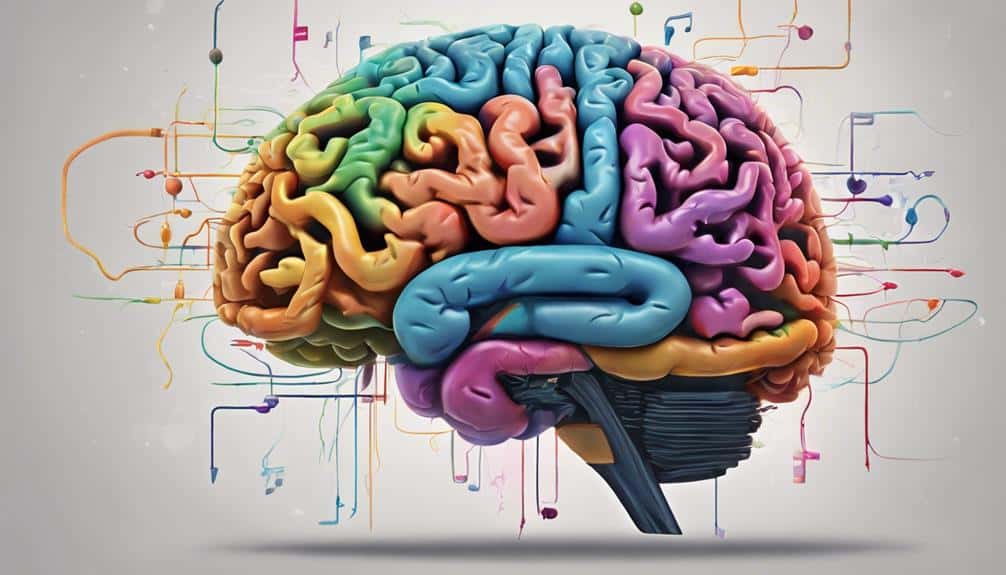
My ADHD brain excels in creative problem-solving skills, allowing me to approach challenges with innovative solutions.
The state of hyperfocus enables me to immerse myself fully in tasks, leading to heightened productivity and efficiency.
Rapid idea generation is a hallmark of the ADHD brain, providing me with a continuous stream of fresh perspectives and insights.
Creative Problem-Solving Skills
How do individuals with ADHD leverage their unique neurodivergent thinking patterns to excel in creative problem-solving tasks?
The strengths of the ADHD brain, such as divergent thinking and the ability to make unique connections, play a significant role in fostering creative problem-solving skills.
When individuals with ADHD hyperfocus on tasks that interest them, they often come up with innovative and out-of-the-box solutions that others mightn't consider.
This unconventional approach to problem-solving can lead to groundbreaking ideas and unconventional strategies.
The ADHD brain's inclination towards thinking differently allows for the exploration of unconventional approaches, ultimately resulting in the development of unique and effective solutions.
Creative problem-solving is a hallmark strength of the ADHD brain, showcasing its ability to excel in generating innovative ideas.
Hyperfocus on Tasks
The unique neurodivergent thinking patterns of individuals with ADHD manifest in their exceptional ability to hyperfocus on tasks, a strength that propels their productivity, creativity, and problem-solving skills to remarkable heights. When in a state of hyperfocus, individuals with ADHD experience:
- Increased Productivity: Hyperfocus allows for intense concentration, leading to the completion of tasks with great efficiency.
- Enhanced Creativity: The ability to fully immerse oneself in a task can spark innovative ideas and solutions.
- Heightened Problem-Solving Skills: During hyperfocus, the brain can tackle complex problems with clarity and focus.
- Flow State: Distractions fade away, enabling individuals to engage fully in the task at hand, reaching a state of flow where peak performance is achieved.
Managing shifts out of hyperfocus is a challenge, but harnessing this strength can help individuals with ADHD accomplish tasks effectively.
Rapid Idea Generation
Rapidly generating a multitude of ideas is a key strength of the ADHD brain, driven by its hyperactive cognitive processes and distinctive neural connectivity.
The unique neural connections in the ADHD brain enable individuals to showcase exceptional creativity and out-of-the-box thinking, resulting in innovative solutions and approaches.
The fast-paced nature of the ADHD brain facilitates quick brainstorming sessions, allowing for the effortless connection of seemingly unrelated ideas.
This ability to come up with multiple ideas in a short amount of time proves advantageous in problem-solving scenarios and entrepreneurial ventures.
Harnessing the rapid idea generation capability of the ADHD brain can lead to success in creative fields, strategic planning, and entrepreneurial endeavors.
Understanding ADHD Brain Motivation
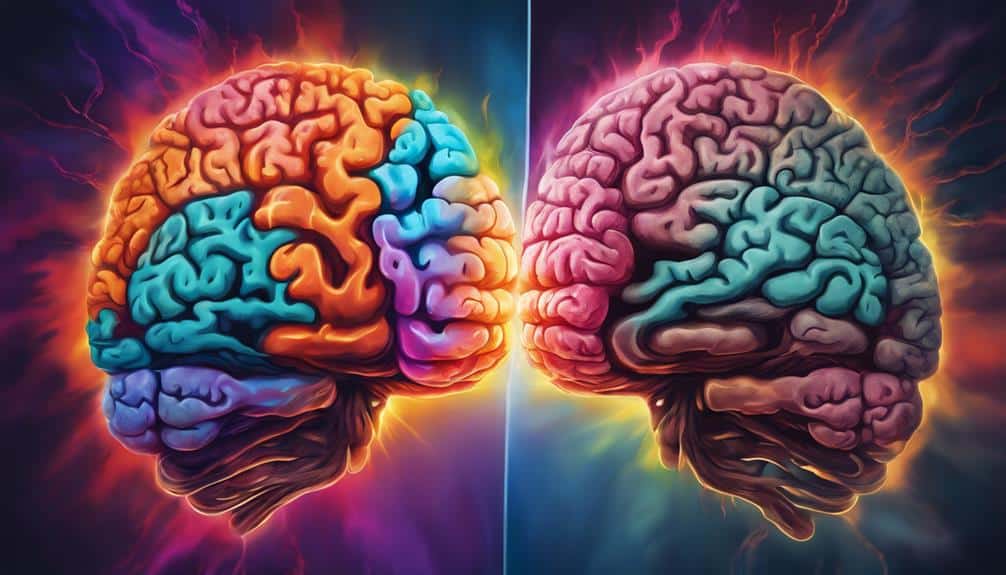
Due to differences in dopamine regulation and reward processing, individuals with ADHD often face struggles with motivation. Understanding the ADHD brain's unique dopamine system is crucial in comprehending motivation challenges. Here are some insights into the complexities of ADHD brain motivation:
- Dopamine Regulation: ADHD brains have altered dopamine levels, impacting their engagement and interest levels in tasks.
- Importance Determination: Individuals with ADHD may find it challenging to determine the importance of tasks, affecting their motivation.
- Unique Strategies: Implementing strategies like aligning tasks with personal interests and following structured routines can help boost motivation in ADHD individuals.
- Task Interest Alignment: Aligning tasks with personal interests can increase motivation levels in individuals with ADHD, enhancing their overall performance.
Supporting Individuals With ADHD
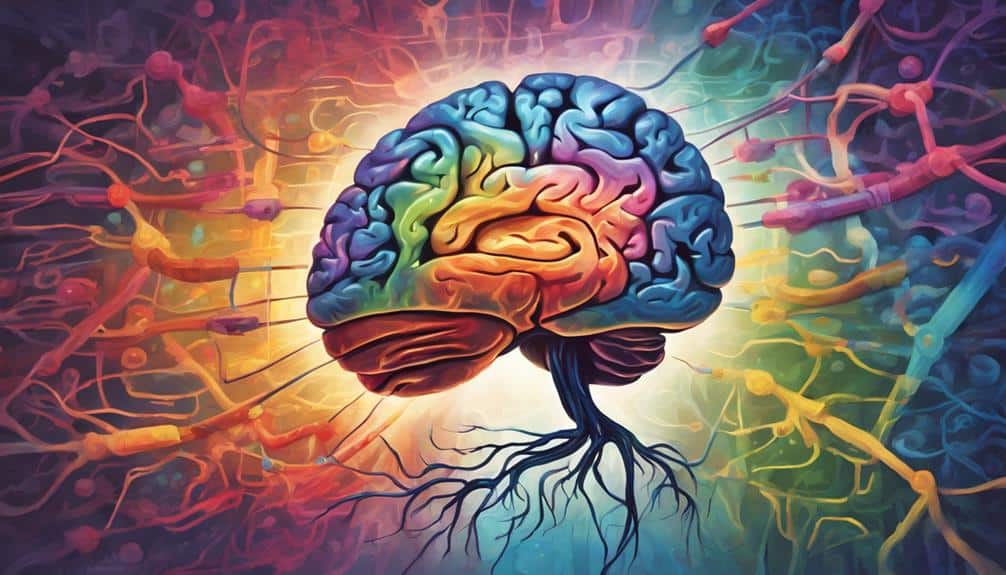
Understanding the intricacies of supporting individuals with ADHD involves recognizing and embracing the unique characteristics of their nervous system to provide effective assistance and accommodations. It's vital not to force individuals with ADHD to conform to neurotypical standards as this can hinder their progress.
By understanding ADHD as a unique nervous system, we can tailor support and accommodations to suit their specific needs. Individuals with ADHD often excel when engaged in tasks that interest them, thanks to their interest-based nervous system. Embracing these differences in nervous systems can lead to the development of more effective strategies for managing ADHD symptoms.
Coaches, doctors, and professionals working with individuals with ADHD should adapt their approaches to meet the unique requirements of each individual. This personalized approach can greatly improve the support and outcomes for individuals with ADHD, allowing them to thrive in their own way.
Frequently Asked Questions
What Is the Secrets of the ADHD Brain Book?
The book 'Secrets of the ADHD Brain' explores the intricate workings of the ADHD brain, shedding light on brain function, neurodiversity insights, cognitive patterns, executive functioning, attention regulation, neurological differences, emotional regulation, learning strategies, dopamine levels, and focus techniques.
What Makes People With ADHD Happy?
When I have ADHD, happiness blooms through engaging tasks that captivate my hyperfocus. Novelty and success in my passions elevate my joy. Supportive relationships, impulse management, and creativity fulfillment are my happiness secrets.
What Are Some Sad Facts About Adhd?
I face employment challenges due to ADHD, leading to financial strain. Stigma and stereotypes create social isolation. Lack of understanding causes relationship strain. Early diagnosis important for educational and mental health support, but self-esteem suffers.
What Are the Day to Day Struggles of Adhd?
Juggling time, managing tasks, and staying focused can be daily hurdles for me with ADHD. Controlling impulses, organizing thoughts, regulating emotions, and completing tasks are constant battles. Memory lapses and brain fog add to the challenges.
Conclusion
To sum up, the ADHD brain operates in a unique and fascinating way, presenting both challenges and strengths. By understanding and supporting individuals with ADHD, we can harness their incredible problem-solving abilities and intelligence.
Just as a complex puzzle requires different strategies to solve, embracing the diversity of nervous systems can open up limitless potential. Let's navigate the intricacies of the ADHD brain with curiosity and empathy, revealing the secrets to unleashing its full power.

